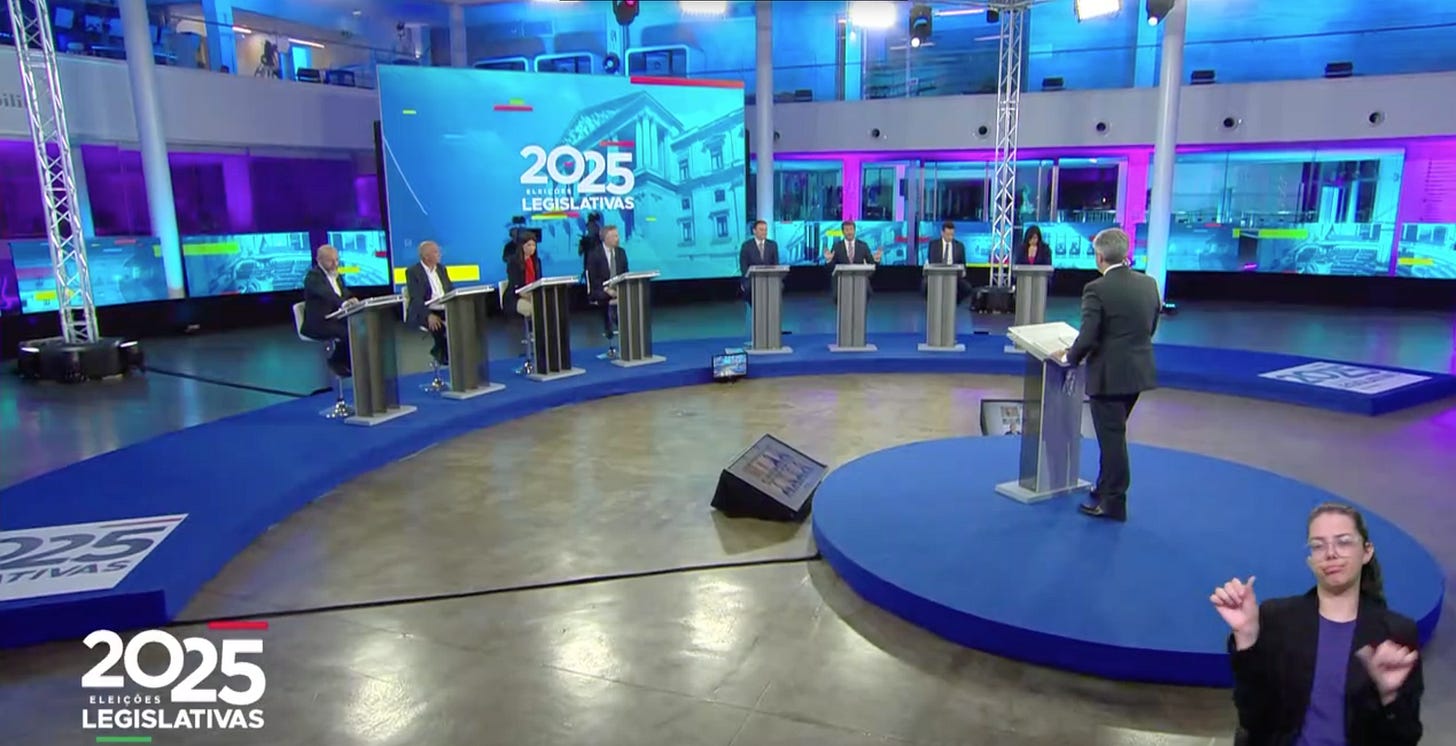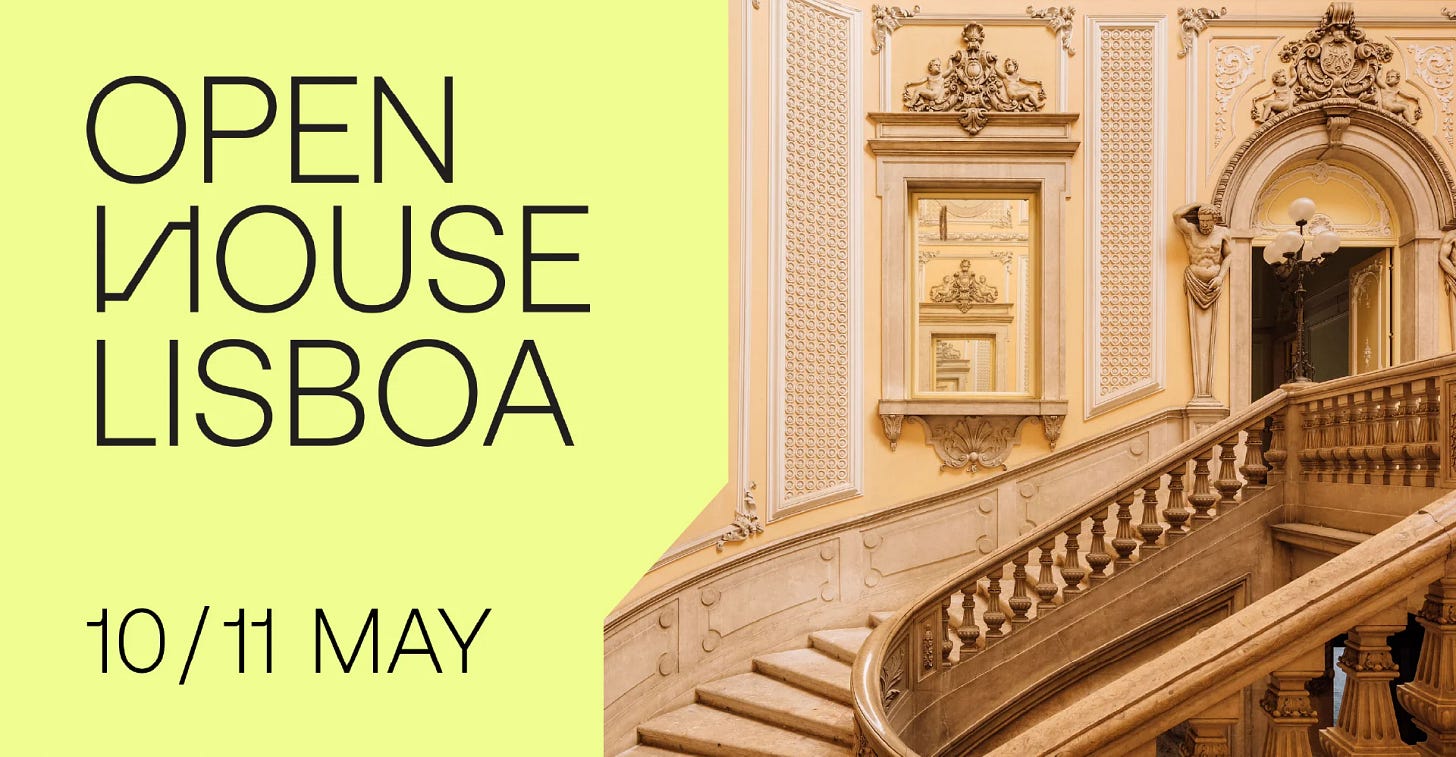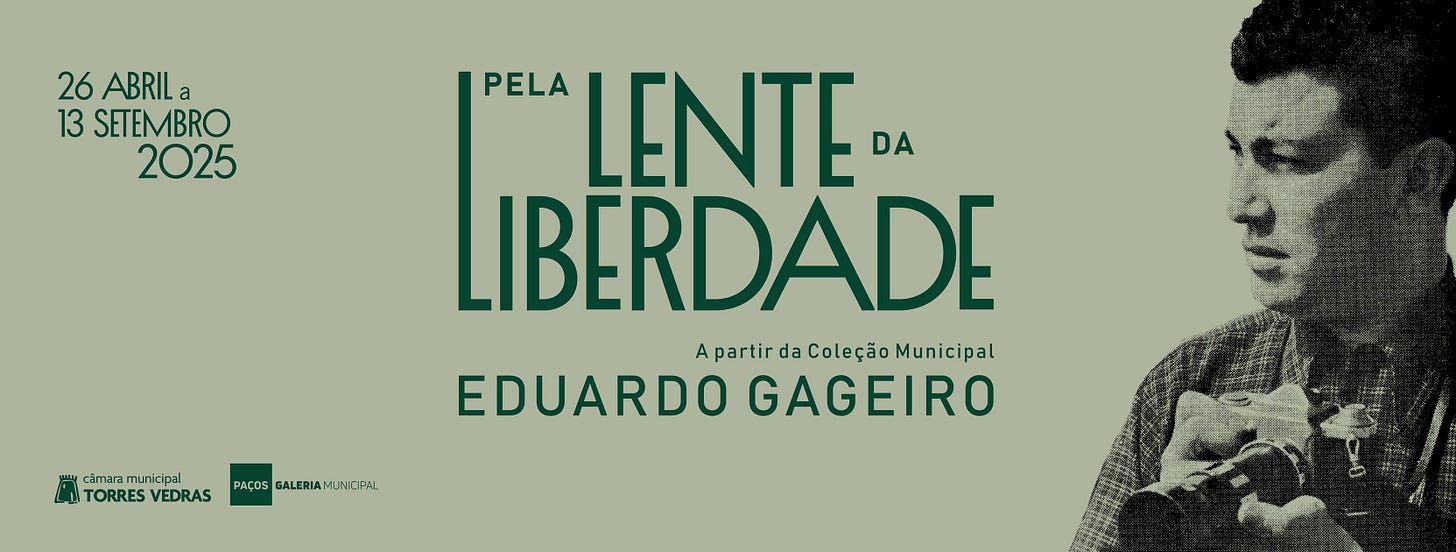Friday Briefing: Is the Government channeling Trump on immigration?
Good morning and welcome to PORTUGAL DECODED. Just as the official campaign kicked off, the Government announced plans to deport thousands. Here's what it means and where parties stand on the issue.
TALK OF THE TOWN

If you enjoy reading PORTUGAL DECODED, please consider donating to keep it free and independent – your generosity means everything!
POLITICS
PM Montenegro criticized the ongoing rail strike, which has brought circulation to a halt across the country, and signaled possible changes to strike laws, prompting Socialist leader Pedro Nuno Santos to accuse him of “authoritarianism” (More).
Chega leader André Ventura faced Roma protests in Braga and Aveiro, where demonstrators called him “racist” and spat at him. Ventura accused them of being “planted” disrupters and told them to go to “work” (More).
SOCIETY
Police dismantled a criminal network accused of facilitating the illegal residency of over 10,000 immigrants, arresting 13 suspects, including a lawyer and an official from the Ministry of Foreign Affairs, and seizing numerous assets (More).
Music star Nininho Vaz Maia was targeted in a Judiciary Police sting against drug trafficking. While no arrests were made at his residence and no drugs were found, he has been formally named a suspect in the ongoing investigation (More).
ECONOMICS
Portugal’s GDP shrank 0.5% in the first quarter of 2025, the sharpest quarterly drop since the pandemic, as exports and consumption weakened. Still, it registered a positive year-on-year growth of 1.6% in the first quarter of 2025 (More).
Portugal’s suspension of electricity imports from Spain after the April 28 blackout has already cost the country over €17 million, highlighting the economic impact of disrupting the integrated Iberian energy market (More).
CULTURE AND SPORTS
All eyes on Lisbon this Saturday at 6pm as SL Benfica and Sporting CP face off in a high-stakes derby that could decide the Primeira Liga title for the first time this century and will surely grip the whole country (More).
Cyclist Iúri Leitão has won an Olympic sportsmanship award for slowing down to allow his rival to recover after a crash in the Paris 2024 omnium final, thus passing up the chance of winning the gold medal (More).
If you enjoy reading PORTUGAL DECODED, please consider donating to keep it free and independent – your generosity means everything!
DECODER
What was the Government’s big immigration announcement?
On Saturday, on the eve of the start of the official campaign period for the May 18 election, the Minister of the Presidency, António Leitão Amaro, announced that tens of thousands of immigrants would begin receiving deportation notices from AIMA, the Agency for Integration, Migration and Asylum. He said that the process was to begin this week, with 4,574 individuals set to be notified that they must leave the country within 20 days or face expulsion proceedings. He added that over the coming weeks, at least 13,500 additional applicants would receive similar notifications and he also acknowledged that 110,000 applications still await review. He noted that many of these may also be deemed ineligible. “Portugal’s immigration policy is now one of regulated immigration,” he announced.

Who are the immigrants potentially facing deportation?
According to the Minister, two-thirds of the migrants receiving expulsion notices from AIMA are from the Indian subcontinent. Another 2.5% are from Brazil and Portuguese-speaking African countries, while 7.5% are from non-Portuguese-speaking African nations. The Minister stated that many of these individuals had already been ordered to leave other European countries or were involved in criminal proceedings that made them ineligible for residence in Portugal. However, as reported by PÚBLICO, the 18,000 notifications cited by the Minister actually span the past eight years, a detail confirmed to the newspaper by a government source but not disclosed during the announcement. This means the notifications are distributed across cases dating back to 2017. Moreover, many of the cases include people who never responded to earlier contacts or involve duplicate files, drawn from the 450,000-case backlog inherited from SEF.
How realistic is the implementation of these deportations?
Not very. The initial notification can be challenged within 20 days and potentially reversed. Moreover, experts stress that physically expelling thousands of migrants is logistically difficult. Artur Girão, head of the AIMA Workers’ Union, says AIMA lacks the resources, training, or authority to carry out removals. If migrants ignore the order and are later identified (for instance, during a traffic stop) they may be detained and sent to a deportation centre. Still, Girão dismisses the idea of “manhunt” operations. In fact, in practice, there is often a large gap between notifications issued and actual expulsions. Experts note that many individuals cannot legally be deported, including undocumented people born in Portugal, caregivers of minors, long-term residents, or those undergoing medical treatment. As one researcher from Nova School of Law explains, lacking a residence permit is not a crime in Portugal - the law criminalizes only the facilitation or exploitation of irregular migration.

So, why did the government make this announcement?
Politics. Even members of Prime Minister Luís Montenegro’s own party acknowledge that the move aims to deflect attention from the Spinumviva scandal (the trigger for the snap election) and to appeal to voters leaning toward the far-right Chega party, whose support could be key to expanding the government’s parliamentary base. So far, the strategy appears effective. In the first and only televised debate between the leaders of all eight parliamentary parties on Sunday night, immigration dominated the discussion. Socialist Party leader Pedro Nuno Santos accused Montenegro of adopting “Trump-like tactics,” warning that such rhetoric could undermine the status of thousands of undocumented Portuguese emigrants in the U.S. and Canada. Chega leader André Ventura, meanwhile, blasted the government for not backing even stricter measures, calling the immigration system a “mess.” Other party leaders dismissed the announcement as pure electoral theatre, an attempt to distract from deeper national issues. In rebuttal, Montenegro pinned the blame on the Socialist Party and former PM António Costa’s administration, accusing them of leaving behind 400,000 unresolved immigration cases and a system with “no control” over who enters or remains in the country.
Did President Marcelo address the issue?
Yes. President Marcelo stressed the importance of understanding what proportion these individuals represent in the broader immigrant workforce, implying that while painful for those affected, the scale must be put into perspective. He further warned against portraying the measure as an attempt to reduce immigration overall, saying such a narrative would be disastrous for the national economy. He emphasized that immigrants are vital to multiple sectors, including construction, agriculture, and tourism. The President also criticized the three-year delay in addressing immigration system reform, which left 200,000–300,000 people in limbo during the restructuring of immigration services. When asked about the politically sensitive timing of the government’s announcement, he declined to comment, saying simply: “That’s something to ask the government.”
What about the civil society?
The announcement prompted widespread outcry. Timóteo Macedo, president of the Immigrant Solidarity Association, accused the government of aligning with the far right: “No one entered illegally; what’s illegal is using immigrants as scapegoats before elections.” SOS Racismo also condemned the plan, demanding an end to the criminalization of immigrants. Several analysts suggested the move serves as a political “smokescreen” to divert attention from poor economic performance, especially the latest GDP figures (see above). Casa do Brasil de Lisboa, an NGO that supports immigrants, echoed these concerns on social media, questioning whether immigration was once again being used as a scapegoat to mask deeper national issues. Meanwhile, Brazil’s ambassador to Lisbon, Raimundo Carreiro Silva, met with Secretary of State Rui Armindo Freitas to monitor how Brazilian nationals may be affected by the government’s plan.
TIPS OF THE WEEK
Lisbon
Open House Lisboa
Open House returns to Lisbon this weekend for its 14th edition with 72 spaces to visit, 23 of them premieres. Organised by the 14th Lisbon Architecture Triennale and curated by architects Daniela Sá and João Carmo Simões. The initiative aims to generate knowledge and accessibility to the city’s heritage through free visits to emblematic spaces of recognised architectural or heritage value. This year’s edition features a list of 72 spaces, 4 Urban Walks, 21 accessible visits, 11 activities in the Plus Programme, and 9 activities dedicated to families. Highlights include the debut of places such as Panteão Nacional, Vilalva Palace – Ombudsman’s Office or Camões Institute. Full programme here.
Porto
Serralves em Festa
The 2025 edition of Serralves em Festa, the free festival organized in Serralves Park in Porto, will take place between 30 May and 1 June. This year’s highlights include Spiritualised, the Portuguese band Três Tristes Tigres, Belgium’s Use Knife, the SAAGARA project by Poland’s Wacław Zimpel, Brazil’s Teto Preto, Ugandan label Nyege Nyege Tapes via Aunty Razor and DJ Tobzy, and the Fidju Kitxora collective. Serralves em Festa is the biggest event for artistic expression in Portugal and one of the most important at international level, with hundreds of activities taking place in the various spaces of the Serralves Foundation. Over the years it has become a must for thousands of Portuguese and foreign visitors, who are offered an intense multidisciplinary programme in harmony with a remarkable cultural and natural heritage. More information here.
Torres Vedras
Pela Lente da Liberdade
The photography and archive exhibition Pela Lente da Liberdade (Through the Lens of Freedom), featuring the work of Eduardo Gageiro, is on display at the Torres Vedras Municipal Gallery until September 13 as part of the city’s official celebrations of the Carnation Revolution. It marks the first exhibition following the municipality’s acquisition of the renowned photographer’s archive. Among the highlights is the photograph Calvário and the Operation ‘End Regime’ Report, which includes a dedication from Captain Salgueiro Maia to Gageiro. On display is a selection of Gageiro’s most internationally awarded photographs, some of which were once deemed “inconvenient by the Estado Novo regime” for exposing the harsh and undignified living conditions under the dictatorship. The exhibition features the striking images captured by Gageiro during the April 25, 1974 revolution as well as several of the cameras and equipment Gageiro.
Loulé
MED Festival
Cape Verde will be the guest country at the 21st MED Festival in Loulé from June 26–29. The festival will highlight Cape Verde’s rich cultural heritage through music, food, film, and visual arts. Events include a tribute concert to Sara Tavares and performances by Ceuzany, Ferro Gaita, and the Cesária Évora Orchestra. Three Cape Verdean-themed films will screen as part of the Cinema MED program. The “Cartographies Transatlantic” exhibition will feature artists with Cape Verdean roots, and traditional crafts and gastronomy will be showcased throughout Loulé’s historic center. Cape Verdean street parades and children’s storytelling are also planned. The festival celebrates Cape Verde’s 50th year of independence and reflects the strong ties between Loulé and the Cape Verdean community. In total, MED will offer 90 hours of music, 54 concerts, 12 stages, and feature artists from 27 nationalities, including Salvador Sobral, Queen Omega, Systema Solar, and Justin Adams & Mauro Durante.
ON A FINAL NOTE…
Were You Affected by the April 28 Blackout?
One of our readers, freelance journalist Nate Singham, is working on a multimedia storytelling project exploring personal experiences from the April 28 blackout in Lisbon. Alongside a colleague, Nate is looking to speak with five individuals willing to share their full recollections and reflections in recorded video interviews. These will be edited into a short film intended to capture a collective memory of that day.
If you have a powerful or unique story you’d like to share, or know someone who does, this is a great opportunity to contribute to a meaningful community project. They’re also collecting any photos or video footage taken during the blackout.
To participate follow this link.







